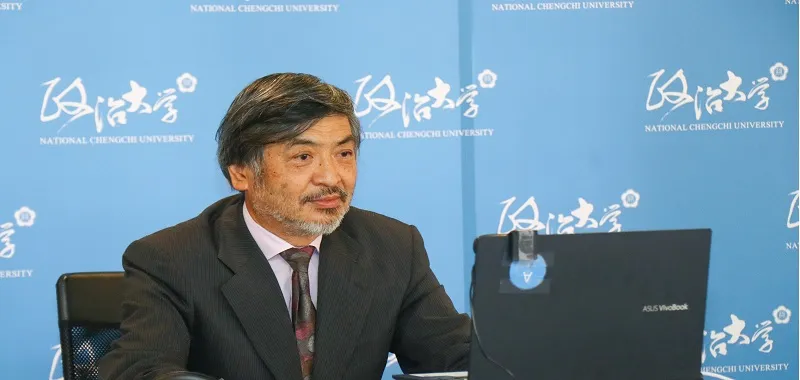NCCU President Ming-Cheng Kuo says two heads are better than one for Asian development
National Chengchi University President Ming-Cheng Kuo has welcomed university presidents and vice-presidents from around the globe for the second installment of the Asian Studies+ President Forum on May 9th, 2022.
The Forum welcomed Sungkyunkwan University (SKKU) President Dong Ryeol Shin, University of Haifa President Ron Robin, University of Trier President Michael Jäckel, and Universitas Gadjah Mada (UGM) Rector Panut Mulyono. The Institut National des Langues et Civilisations Orientales (Inalco) Vice President Gilles Forlot and Adam Habib, Director of the School of Oriental and African Studies (University of London) were also among the speakers.
NCCU Vice President for International Cooperation May-Shine Lin moderated the forum, and kicked off the session by describing the university’ prominent global position in Asian Studies, and highlighting the importance of academic networking. “There’s only so much one university can do, but the possibilities when several universities stand together is enormous.”
The forum’s first speaker was President Ming-Cheng Kuo, who began the meeting by highlighting Taiwan’s unique position within Asia and some key points of Taiwan’s development successes. “Today, Taiwan is not only known for its high-tech achievements such as semiconductors, it is also recognized by the international community for its peaceful transformation to democracy and its human rights record,” President Kuo said.

 (President Kuo discussed Asian studies and development with presidents and vice presidents online.)
(President Kuo discussed Asian studies and development with presidents and vice presidents online.)
SKKU President Dong Ryeol Shin spoke of his university’s over six centuries of development and excellence. “Breaking the mold of Korean Universities, Sungkyunkwan University is emerging as a world-renowned university,” President Shin said. SKKU has several institutes, graduate schools, and interdisciplinary programs focusing on Asian studies, such as the Institute of Confucian Philosophy and Cultures, the Interdisciplinary Program of Korean Studies, and Sungkyun Institute of China Studies.
President Ron Robin of the University of Haifa gave the panel an introduction of his university, followed by an outline of the university’s work in Asian Studies. He shared the wonderful view of the Haifa campus that is on top of Mt. Carmel and said that the university celebrates the religious and cultural diversity of its students.
President Michael Jäckel of University of Trier also told how his university has history that stretches back to the Middle Ages, with the modern incarnation opening in 1970. Trier is a German city with a rich history that includes ancient Roman architecture, and being the birthplace of Karl Marx. He also said that the University of Trier’s summer school program attracts a high proportion of Taiwanese students, with the majority of those students coming from NCCU. The University of Trier has several Taiwan specific areas of studies and has recently launched the “Taiwan als Pionier” (TAP) project which examines Taiwan’s policies during the pandemic, as well as its experiences in digitalization.
INALCO Vice President Gilles Forlot introduced to the Forum his university’s extensive international programs that include 14 research centers, one of which focuses specifically on the East Asian region and hosts 90 PhD students. There are also research centers and courses for South East Asian studies, Linguistics in Asian countries, Mongolian studies, and Arabian Studies.

 (University leaders from South Korea, Indonesia, France, Israel, Germany, and the UK joined the forum and shared views on Asia.)
(University leaders from South Korea, Indonesia, France, Israel, Germany, and the UK joined the forum and shared views on Asia.)
SOAS University of London Director Adam Habib provided the forum with his reflections on the possibility for a global alliance for Asian Studies, and he reflected thoughtfully on some of the major challenges of international cooperation of our time as he saw them. Director Habib said that SOAS’s most recent strategic plan explicitly commits SOAS to working with institutions around the world and involving cooperative alliances. “We are very keen on it” he said, “and we would like to partner with countries to do so.”
He also said however, that a fundamental challenge was figuring out how to make this happen in practice. “Asian studies in their traditional form are effectively something where the market is shrinking,” he said. With this challenge in mind, Director Habib suggested a radical transformation of the way international alliances were constructed that could include co-circulation, and even co-accreditation.
UGM Rector Panut Mulyono joined the forum from Indonesia, and introduced how his university is working hard to support more discussion surrounding Asia and ASEAN. “Our belief is that Asian studies should have a place in transforming the shape of the world,” he said. Rector Mulyono also told the panel about the ASEAN Studies Center – a collaboration between the Indonesian government and ASEAN. The Center aims to strengthen research disseminate information about ASEAN and surrounding issues through range of events such as seminars, workshops, training and intensive discussions.
In the discussion session following the forum, participants agreed that there was great potential for an international Asian Studies alliance to be established and thrive in the future, and that such an alliance could bring an “Asian perspective” to some of the most challenging issues of our time. With a Chinese saying “Two heads are better than one,” President Kuo invited university leaders to join forces and collaborate more in the future.